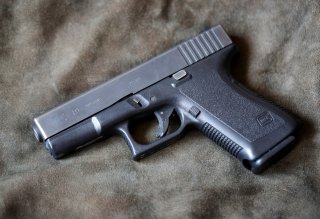There's a Reason the World's Best Militaries Love These Handguns
The global arms trade has produced many excellent handguns, but these are the best and best-loved.
Here's What You Need to Remember: The Sig Sauer P226 served with the U.S. Navy SEALs for twenty-eight years, before eventually being replaced by the compact version of the Glock 17, the Glock 19.
The bustling global arms trade has resulted in many excellent handguns in the last hundred years. Some of the best handguns are more than a hundred years old, while others have been in production for less than a decade. All are excellent weapons for defense, and in some cases offense; they are equally at home in a homeowner’s gun safe or carried as an officer’s sidearm. Here are five of the best handguns currently in service worldwide.
The Colt M1911A1
Designed by prolific gun designer John Moses Browning, and first introduced in 1911, the Colt 1911 pistol was meant to replace weaker .38 caliber pistols used by the U.S. Army during the Philippine Insurrection. The 1911 was the U.S. military’s first semiautomatic handgun, marking a permanent turn away from military revolvers.
The original 1911 weighed 2.4 pounds and had a seven-round internal magazine. In 1924, the gun was updated, mostly for ergonomic reasons, to the 1911A1 standard. The 1911A1, while internally complex by modern handgun standards, is still a popular handgun. The end of handgun’s patent, coupled with the weapon’s enduring usefulness resulted in almost every major U.S. gun manufacturer releasing its own version of the handgun. In 2012, the U.S. Marine Corps Marine Special Operations Command adopted the Colt M45A1, an updated version of the 1911A1, as its standard handgun.
The Glock 17
The Glock 17 was built around three key ideas: simplicity, reliability and ease of use. The handgun is easy to take apart, with a single press of the button removing the slide for cleaning and access to the barrel. The Glock passed the Austrian Army’s reliability test with flying colors, jamming only once in ten thousand firings. And the weapon was expressly designed with an eye on “pointability”—the pistol’s natural ability to act as an extension of the shooter’s hand-and-eye coordination.
From the original Glock 17, capable of carrying seventeen rounds of nine-millimeter ammunition, the Glock line has expanded to cover nearly all semiautomatic calibers, including .45 ACP, and the gun has replaced the 1911A1 pistol in such organizations as Marine Special Operations Command and the U.S. Army’s Delta Force.
The Sig P226
Developed by the Swiss-German partnership Sig Sauer to replace the M1911A1 in the U.S. Armed Forces, the Sig P226 failed to win the contract but received a major boost when U.S. Navy SEALs rejected their Beretta M9 pistols in favor of the Sig.
The P226 was an evolution of the Sig P220, a postwar favorite of Western and Western-oriented (such as Japan) armies worldwide. The pistol is a so-called double-action design, meaning a single long pull of the trigger will both cock the pistol and release the firing pin, firing the pistol. Users can also operate the Sig in single action mode, in which the pistol is manually cocked and a shorter trigger pull releases the firing pin. The pistol is equipped with a side-mounted decocker for lowering the hammer without firing.
The Sig Sauer P226 served with the U.S. Navy SEALs for twenty-eight years, before eventually being replaced by the compact version of the Glock 17, the Glock 19.
The Smith & Wesson M&P
Smith and Wesson is one of the oldest names in American firearms. Although the company was mostly known for revolvers, it was inevitable that the company would come out with a Glock-style polymer handgun. The result, the M&P (Military and Police) became highly successful in its own right.
Introduced in 2005, the M&P features a steel-reinforced polymer frame and stainless-steel slide. The M&P was one of the first guns to feature three interchangeable palm swells, allowing the user to configure the pistol to better fit his or her hand. The M&P also features ambidextrous slide stop and magazine release. Unlike the Glock, the M&P can be disassembled without pulling the trigger.
The M&P is available in a number of midsize pistol calibers, including nine-millimeter, 357 Sig and .40 Smith & Wesson, as well as .45 ACP. The M&P mostly serves in police forces in the United States and abroad.
The CZ 75
One of the best handguns in the world wasn’t even available to recreational shooters for much of the Cold War. The CZ 75 handgun, introduced in 1975, borrowed a great deal from John Moses Browning’s late model pistol, the Browning Hi-Power, both externally and internally, but is not a copy, and features significant differences. The nine-millimeter pistol could carry up to sixteen rounds, making it one of the largest-capacity handguns of its day.
Locked away behind the Iron Curtain and unable to secure contracts with the Czechoslovakian government, the CZ 75 failed to gain adherents until the fall of the Berlin Wall in 1989. Today the pistol is available in an updated form, the CZ 75BD, featuring a firing pin safety, decocking lever and underbarrel accessory rail, and available in a variety of midsized handgun calibers.
Kyle Mizokami is a defense and national-security writer based in San Francisco who has appeared in the Diplomat, Foreign Policy, War is Boring and the Daily Beast. In 2009 he cofounded the defense and security blog Japan Security Watch. You can follow him on Twitter: @KyleMizokami. This first appeared in December of 2017 and is being republished due to reader interest.
Image: Reuters

